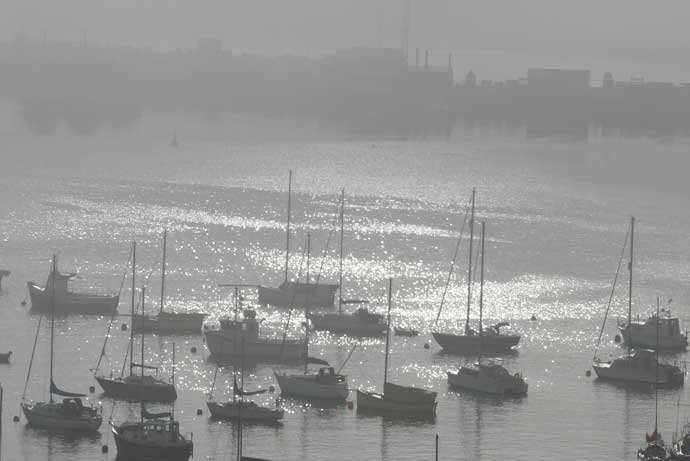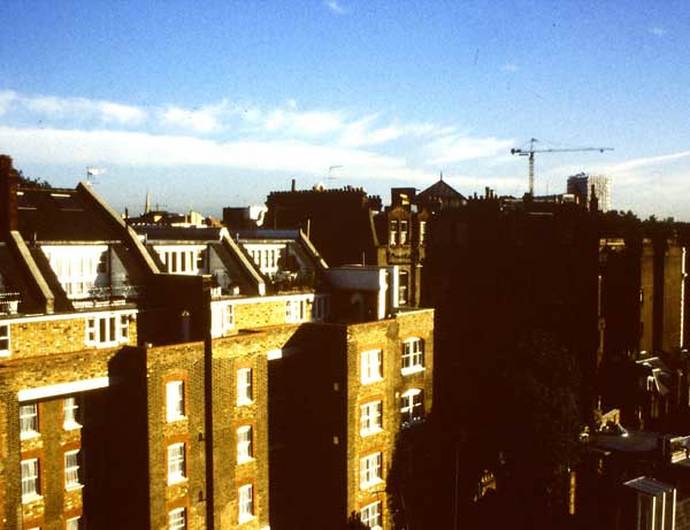If you’re reading this, you’ve survived - well done. Go tell your story to that photogenic team of government scientists - yes, those people over there, the thoughtful-looking young woman, the young man with glasses, the older man with an authoritative grey beard, the ethnic mix, the stereotypes - who are stepping through everything in their hazmat suits, breathing audibly and carrying old-fashioned geiger counters. No, that’s not a car alarm going off. Collect a thin grey blanket before you go - as a survivor you need to have a thin grey blanket round your shoulders - and make sure that tall young guy at the back - yes, the one shouting that it’s not over yet; the one they’re all stubbornly ignoring - hears what happened to you (sorry, hears exactly what happened to you).
Bit early for a swerve off into fantasy, surely? Because this could be Only The Beginning. [Oh, the wind outside my window. I look up and the sun’s gone and the trees are really moving - I can hear them. This could be evidence that The Creation, or The Universe, or Reality, call it whatever you like, pretty much gives you what you expect to get from it*. I didn’t really mean it about the hurricane and the solar flare. Life meets expectation. It’s been done before, keeps on being done, but it’s still an attractive story idea. If I ever get round to creating a universe, I’ll include that as one of the sub-quantum rules of nature. But - okay, yes. Doesn't fit with the "expectation" theme, but let’s keep the scene in which the scientists send a vast electron microscope whizzing round and round a circular tunnel under a Swiss mountain – and find me grinning back at them. “Surprise!”]
We’re celebrating the word “could” today. Five letters, not bad for Hangman because it’s short and even if you do get those two vowels early on, you’re still not really there. More useful as a tool for getting yourself a high profile in the media. If you can cook up some half-way plausible we’re-all-doomed scenario, base it on at least some kind of evidence and give yourself a job title that sounds impressive, you can really, ah, wow the punters, I believe that’s the phrase, with your concerned expression. But do practise it in the mirror first. No point going on the news to discuss your survey finding that cloudy days could lead to global warming - and failing to control your own urge to giggle.
He's got himself back on track. That's a surprise. And remember - “could” be, not “will” be. It’s the secret of all forecasting. You can dress it up and say just about anything if you remember “could”. As Head of Irresponsible Forecasting here at the Falmouth Institute of Unreliability, I’ve studied the signs, and I believe that they could point to the kind of outcome that will keep your viewers coming back for more. If I step up to the podium and show you - click; sorry - show you this - click, click; could use a little help here, this remote - what? Oh, press the green button with the arrow on it, sorry, ha ha – show you this footage of the drama unfolding outside my window this morning. You see the clouds? The sun shining? And if you listen to the wind - I’m sorry, the audio seems - ah, here we are; click - listen to the wind, you see - hear, of course - see and hear clear signs that we could be in for a storm later. And that could develop into an apocalypse.
Yes, I know it’s a sunny day with a light breeze, but it could develop, is what I’m saying. Honourable mentions, by the way, for two recent articles, both effortlessly qualifying for gold in this blog post’s I Take It All Back category. Read How AI could kill off democracy by Jamie Bartlett at newstatesman.com, which is a serious analysis of a credible threat, and Sarah Gordon’s Why Brexit could save Britain’s countryside, Weekend FT magazine, 25th/26th August 2018, which describes a possible future for British farming. Both articles are clear evidence that the word “could” can be used constructively. I’m just allergic to the “Somebody says something could go wrong” style of headline-writing, which seems fashionable these days.
He’s holding it together quite well now. All of the above is just “Could” at work, though. In her personal life, Could is a free agent. Much happier than Should, who lives in the flat next door and never comes out for the spontaneous street parties that are such a feature of life in this imaginary universe. Should is weighed down with obligations, and worse, she’s never sure where those obligations came from - upbringing, education, social and work pressures generally – but they’re deep in her psyche and she’s only now learning to recognise them, let alone challenge them. Could tries to help, and they’re close friends, really, but it takes a lot of coaxing to bring Should out of her shell.
Oh, here we go. Spoke too soon. Could’s apartment is bright and airy, with light-wood floors and tall windows and billowy light curtains that move in the fresh air. There are mirrors and pictures and plants and a drafting table on which there’s always some new design being brought into being. Could works for herself, she’s freelance, but it’s more accurate to say that she plays for a living: she paints, draws, calls herself a graphic designer and makes very little money, but she’s happy following her own spontaneity. Small local galleries display (and sell) her pictures; she illustrates children's books and designs book covers; those are her funny little cartoon figures dancing through the pages of that magazine you like. If she could see her thoughts, which she can’t, she would paint them as butterflies. She’s late for everything, but people are invariably pleased when she does finally arrive.
He’s off. Should works in a bank. It’s a safe job. She has a pension scheme, and although she isn’t paid as much as you might expect, she’s already quite wealthy. If you ask her what she does, which you won’t because she doesn’t inspire curiosity, she’ll tell you that she’s in compliance. Then she’ll start to explain compliance - until Could, who knows her friend well, comes over to rescue you. Everybody wants to know what Could does, and sooner or later, you’ll see her being mobbed by expensive-looking people trying to impress her with whatever they value about their own lives. But she doesn’t like fast cars, she’s never heard of wherever you said, and she doesn’t go skiing anywhere, let alone there.
This time, Should rescues Could, because Should is beginning to recognise that (against all reason) Could is where the action is. If even her bosses are drawn to Could: if they’re challenged by her; if they need her to know that they matter - then what is it that she has, that they don’t? Should is a thinker, and finally, she’s turning her thought process to her own situation. Having lived next-door to Could for so long, having watched her from the day she moved in, having consciously dismissed her at first and then become gradually fascinated, having at first nurtured a sneaky feeling of superiority over her neighbour that, if she's honest, had to be worked at even from the outset, Should is finally beginning to realise that Could is not just irresponsible, careless, foolish after all. She's all of those things, yes, but there's something else as well, and Should wants to know what it is.
There’s going to be a moral. I just know there’s going to be a moral. Lying awake one night listening to the faint sound of music through the wall, Should thinks: I know what I’ve got, and how much, and where it is, but what am I doing with my life? What am I doing with my life right now, not in some planned-for future that won’t happen that way anyway? And exactly then, at four in the morning, midweek, Should gets out of bed, disables the alarm in the main room, turns on all the lights in the apartment, and sits on her sofa to make herself a list. She’ll research sound systems in the morning. Buy a bottle of wine. Perhaps a stylish little wine rack, she thinks, looking through at her kitchen. On impulse, feeling very brave, knowing what time it is, Should goes and makes herself a cup of tea. I’ll call in sick tomorrow, she thinks; I’ll take a day off. She doesn’t, but the thought that she nearly did sustains her through the day.
Could nearly misses the invitation. It’s in a matching envelope, small one, tiny weeny don’t-see-me one, with her name printed in tiny capitals on the front, slipped under the door near the hinge - the door catches it and slides it out of the way. But Could does see it, and life changes. The invitation says: would she like to join Should for a quick glass of wine tomorrow evening at six? Not a party, nothing special, just a quick glass and a chat. Like neighbours do. Sometimes. Not important if she can’t, so don’t worry, they can arrange another time, silly of me to assume… Could checks the time. 11pm. She’s just got in. Glass of wine - hey, yeah. She grabs the flowers from the vase - dripping, so takes the whole vase - and goes.
Uh oh. Should opens the door sleepy-eyed in dinky pink pyjamas and a matching dressing gown, big fleece slippers, a sleep-mask pushed up onto her forehead. She’s seen through the spyhole that it’s Could, but they still have to wait for a moment while she unlatches the chain and opens the door properly. Then there’s a misunderstanding that they both laugh about later: Should thinks there must be an emergency; Could tries to explain that she’s just come round for a drink now rather than waiting for the time stipulated on the invitation. "Why plan to have a drink tomorrow when we can have a drink today?" says Could.
In the end it’s Could who gets them inside, points out that it’s the weekend tomorrow anyway, gets the wine opened, gets them both sitting on the sofa, glass in hand, close together, Could doing the talking but Should at least nodding along, that little frown between her eyebrows showing that she's listening...
I don't believe it! Then it’s Could who acts upon a sudden impulse to-
But it's Should who follows up "Oh!" with "Okay..."
And there we leave them. I Could go on, but I don’t think I Should. They’re together now, still in separate apartments but thinking about it, and this works quite well as a happy beginning.
Yep. Told you. Here comes the moral. Did you notice “happy beginning” not “happy ending,” by the way? Very cute. Amazing how far you can go, if you bring together Could and Should.
*The Cosmic Ordering Service, Barbel Mohr, 1998
Hold a Second Referendum, and you end up with a “best of three” campaign - assuming the people get it right this time - in the sense, they don’t show themselves up once again to be incapable of understanding the issues as clearly as We do. The whole B - my spellcheck suggests People’s Previous Vote - argument only goes away if the People’s Vote confirms that The People Meant It. Add the no-shows to the Leave votes, and you get a majority of people who didn’t vote to remain in the EU. Or vice-versa, yada yada.
If we can accept a People’s Vote but be against Referendums on some kind of principle, and if we can accept that The People voting in a People’s Vote somehow outvote the people voting in a referendum, then we arrive at an argument for correcting votes with Votes. Maybe the simplest thing would be to correct the result of the last general election with a People’s Election, and we can set off down that route to freedom and democracy.





